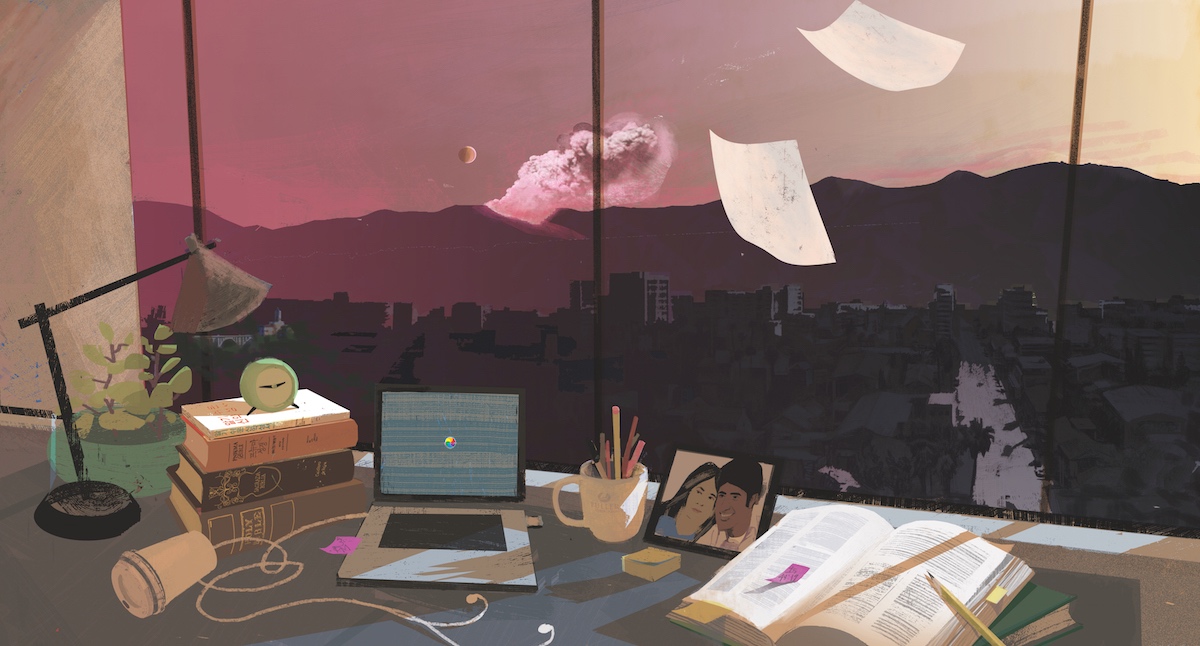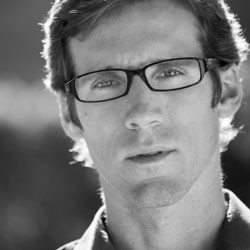
“Now therefore thus says YHWH of hosts: Consider how you have fared. You have sown much, and harvested little; you eat, but you never have enough; you drink, but you never have your fill; you clothe yourselves, but no one is warm; and you that earn wages earn wages to put them into a bag with holes. . . . For thus says YHWH of hosts: Once again, in a little while, I will shake the heavens and the earth and the sea and the dry land; and I will shake all the peoples, so that the treasure of all peoples shall come, and I will fill this house with splendor, says YHWH of hosts.” Haggai 1:5–6; 2:6–7
“See that you do not refuse the one who is speaking; for if our ancestors in the faith did not escape when they refused the one who warned them on earth, how much less will we escape if we reject the one who warns from heaven?! At that time his voice shook the earth; but now he has promised, ‘Yet once and for all I will shake not only the earth but also heaven.’ Now this phrase, ‘Yet once and for all,’ indicates the taking up of shaken things as made things so that things unshaken will remain. Therefore, since we are receiving a kingdom that cannot be shaken, let us give thanks, by which we worship God virtuously with reverence and awe; for indeed our God is a consuming fire.” Hebrews 12:25–29
The Bible has often lent itself to fearful and privileged Christians’ overblowing their crises, exacerbating some already sloppy theology. Framing the recent convulsions moving Fuller in terms of the shaking of Sinai, of Israel’s exile, and of the kingdom from heaven through Jesus may seem to be just that—overblown. After all, Fuller is a theological school scarcely two generations old, small by many measures, and moving its main campus all of 25 miles from Pasadena to Pomona. Those of us who study or work at Fuller have hardly faced hunger or exposure, as some of our neighbors in Pasadena do, to say nothing of people in other places in Los Angeles or in Aleppo or Gaza or San Salvador, or in more rural places that are conspicuously absent from our social media feeds. And the disruption shaking Fuller, even as fomented by turbulent national politics, racing trends in higher education, and global technological change, remains a phase. Yet Fuller is undergoing a shaking arguably unprecedented in our institutional history. We are being both forced and invited to ask rattling, far-reaching questions about who we are and what we are called to do as a seminary based historically in the Los Angeles area and committed to God’s rule of justice and peace throughout the world. As we move our main campus to Pomona in hope, we are summoned to ask and address these questions by the light of Scripture, which will not allow us to avoid its epic terms and yet urges us to understand them in the nitty gritty of the flesh, our particular places and moment, the apocalyptic ordinary. How not to escalate what we must negotiate soberly and assiduously? How not to underestimate the presence of the judging and saving God in mundane disruption?
Growing from the First Testament, the New Testament is 27 books of witness to disruption. Disruption brought by oppressive Roman rule, corrupt authorities among the people of God in and out of the church, food scarcity, restive human hearts, demonic forces that exploit human institutions and speech to estrange people from one another in fear, and in all this the self-revelation of God in Jesus by the power of the Spirit. Rome’s peace was a destructive lie and a cover, and Jesus was a disturber of that peace. Yet the disruptive God revealed in Jesus to a disrupted world “is our peace” (Eph 2:14), bodily digesting the shaking forces of death in such a way that he “remains . . . forever” (Heb 7:3). As Fuller responds to the disruption that is moving our campus home to Pomona and perhaps shaking us to our institutional bones, Scripture urges us to avoid any easy talk of disruption as good or bad. In the face of the temptation to quickly imagine what disturbs us as a prelude to triumph, it teaches us to refuse a neat story of progress. It guides us to avoid a single story of disruption from the outside that absolves us of responsibility, one that minimizes our failings in order to deliver a hollow, rhetorically inflated promise of success, which has proven so politically seductive to evangelicals and others in the United States. It invites us instead to learn to discern together God’s fiery hand in the disruption we are experiencing, calling and enabling us to grow into a future of service in and from Pomona, one that can be at once powerful and joyful, if we walk justly. In fact, this calling and enabling involves our ability to name what injustice we have contributed to the disruption moving us to Pomona so as to address it in the shape Fuller takes as we move.
But calling out our disruptive institutional failings, as the prophet Haggai does in the passage quoted above, is hard. Fuller lives in part by a forgetful market that addicts people to appearances and assurances of “growth,” of “progress.” Who wants to invest their lives or their money in an enterprise sitting patiently with its flaws and disappointments, naming how our move to Pomona is partly a consequence of our own mistakes, and naming those mistakes specifically? Typically, most of us have room for public confession only as a quick stop on the path of making ourselves great again. We find it near impossible to name sins we do not know how to redeem. In the face of disruption, we are prone to slap together a master narrative of ourselves as victims rising to triumph, with no patience for how we have driven ourselves to the difficulties we face.
Haggai invites the people of God in his generation to resist any such impulse and to take a long look at the causes of their current anemia as they attempt to revitalize an ordinary life together after a generations-long decline. They are to consider the little they have harvested from what they have been sowing, their biting hunger and thirst after all they have consumed, their relentless shivering despite their warm clothes, how they have poured their labor into bags full of holes, and to inquire into the causes of their condition—especially the easily repressed, less soothing causes. The prophet describes not a lack of effort but of soundness and wisdom, a lack that has kept the people from health in a demanding time despite their vigorous toiling after success. And where people are tempted to point the finger at what might be thought uncontrollable external factors of bad weather, infertile land, and barren bodies, the prophet says the people have had a hand in those factors by the way they have lived. Specifically in Haggai’s time, they tended to their own houses while neglecting the house of the Lord. Their work has been insufficiently common, more fragmented self-promotion than service in a shared place.
The horizon of Fuller’s life in and from a hub in Pomona is worthy of some excitement, even as it is full of uncertainty. The opportunity for Fuller to reform itself into the seminary needed for our time is immense. Yet, with Haggai as our guide, we should avoid certain temptations in the evangelical air and institutional water that we have inherited, particularly the tendency to form a clean, master narrative of triumph. Instead, we must cultivate multiple, truthful stories woven in healthy tension with one another. We must be transparent about the fact that Fuller has been forced to pursue such a disruptive move not only because of declining enrollment but also because of a protracted lack of financial and institutional discipline, which for years overextended our school. The weather for Christian higher education has indeed been bad lately, but we have had a hand in making it especially bad for Fuller. What is more, general enrollment numbers themselves may not be a reliable measure of the health of Fuller. We must take into account less detached and statistical considerations, which will often indict us as a seminary and hurt us to admit. For example, the inability of the School of Theology, my school, to retain faculty and students of color, combined with the clear testimony of some of these Fuller voices as to why, is an unequivocal call for patient confession and substantive processes of reform. And it is not a concern that can be dismissed by some as the problem of others but one that addresses us all.
Optically, the beautifully dark city of Pomona, vibrant with people of color, is a better aspirational fit for a Fuller engaged in the community hosting its main campus, one that, not coincidentally, provides the more affordable place that Fuller and its residential students need to live. But let us refuse the longstanding tendency in a situation like this to forge one, bright story along “missional” lines. It would not only trade in white Christian tropes we are learning to renounce but would be unsound to the extent that Fuller has not been meaningfully engaged in the community of our current place of Pasadena. And without a viable and public plan for how Fuller will help rather than hurt efforts to stem in Pomona the same gentrification that has engulfed, whitened, and segregated Pasadena, we cannot say soundly that we’re moving to a more fitting place for Fuller, certainly not that Fuller will be good for Pomona. Amidst the current trends in higher education and the global and digital spread of the Fuller network, some of us may even be tempted to navigate the current disruption by minimizing the geographic place of the Fuller campus altogether, to use “place” only metaphorically in yet another iteration of the white Christian tendency to withdraw from the body and the earth, only to colonize these in spiritual disguise. But we cannot do this while saying meaningfully that we are committed to the place and community of Pomona, which we must be as Christians. And disclaiming what little roots we have developed in Pasadena, saying, “Fuller is a people rather than a place,” is no way to digest the grief of leaving.
Technological disruption, itself an expression of wider cultural shifts, is one of the major forces shaking Fuller and requiring us to ask afresh what sort of education Fuller must deliver. Pomona will not be the center of Fuller, much as our Pasadena campus has ceased to be. The stories of our campus life will be only some among others centered elsewhere by virtue of digital technology. The crucial work of Fuller that does take place on our new campus in Pomona, from class sessions to media production to library research to one-on-one meetings between professors and students, will not necessarily be representative of what Fuller people are doing in other places. As we respond to the different needs of our many places, then, the contributions of faculty as researchers, writers, and classroom teachers will be part of a whole with noteworthy contributions by others, with whom faculty in Pomona or elsewhere may or may not collaborate according to our gifts. The widespread and disruptive deprofessionalization of theology, because of which theology is disseminated less and less from academic towers, deserves a faithful response from Fuller, one that will sometimes prioritize the contributions of people other than the faculty in Pomona or elsewhere. Those of us who are faculty members will need to face this sort of disruption with generosity, recognizing the limits of our competence.
Nevertheless, just as it would be foolish to forsake the academic vocation of Fuller, it would be a mistake for Fuller to be ungrounded in any place. We must learn through the present disruption to be grounded in many places, especially in our new place of Pomona as we continue to rigorously study theology, psychology, and mission. Fuller cannot be a source of health and justice for other places if it is not living healthily and justly in its own places. This will involve carefully studying how to be a new arrival in Pomona, one that is relatively large and mostly white, and how to leave Pasadena healthily and justly. If Fuller aims to “grow globally,” and I’m not sure that should even be a goal, we must avoid the destructiveness of a market shaped by remote and bodiless ownership. Such a market is driven by impatient and unhuman transactions. It knows nothing of a God locally and stubbornly placed in flesh, who as such has consistently been unattractive and unimpressive to other human beings according biblical testimony (e.g., Deut 7:7; Ps 118:22; Mark 6:4; John 1:11; 1 Cor 1:23). Rather than succumbing to market pressures that encourage educational control and creation only from a remote market center in Pomona, with nothing but conformity and consumption anywhere else, we must grow soundly enough in our various particular places to have something worth sharing with other places. Will our work in and from Pomona be grounded and common enough? Will it be service?
Haggai does not leave his shaken generation or ours without hope, if we can sit long and publicly enough with the truth of our failings so as to address them rather than reiterate them as we move ahead, if we can move justly. The Spirit of God remains with the people of God, the prophet says, so that we need not be further corrupted and fragmented by fear. He promised in his day that the God at work in the people’s partly self-inflicted disruption would again shake the heavens and the earth, as God had in Egypt and in the invasion and exile of Israel, this time rattling all the peoples, of which we at Fuller today are members. The effect, as the work of God’s people proved common and serving, would be a life filled with the vitality and material gifts of all the peoples. Our shared life in service to the one, uniting God can grow into joined places of splendor.
The book of Hebrews invokes this ultimate shaking as the work of Jesus in the passage quoted above. It is a messianic eruption growing from its seed, the fiery quaking of Sinai that shook Israel’s life loose from the enslaving web of Egypt and set it on the path of promise. If these ancient ancestors in the faith did not escape the pressures of God’s judgment through the guiding words of Moses the servant, how much less, the writer asks, will we escape the ultimate pressures of that same God’s judgment through Jesus the Son? As God’s human heir over all created things, Jesus calls to us with a name and memory that have exhausted the power of death and reach to even the most hidden parts of the earth. Thus, the shaking Haggai announced is finally the disrupting judgment of the risen Jesus, which is rattling everything that humanity has made on the earth, using even the disruption we have brought upon ourselves, so that only what has been transformed by God into the unshakeable will remain.
The disruption caused by the ideological and technological weather in conjunction with our own deep flaws is shaking Fuller and exposing some of what is shakeable about our seminary. As we move our main campus to Pomona, certain branches of Fuller’s past will be shaken loose, and Jesus will continue to rattle us in Pomona and other places. Together we must distinguish between what Fuller has made and what, through Fuller, God has made and is still making by the now unshakeable life of Jesus. This disruptive Jesus reveals that the unshakeable is not what can sell itself as impressive in the short term. That kind of institutional mentality, alluring as it is in the currents of our time, will subject Fuller to forces that will undermine it over time as we pour our labor into bags full of holes and work ourselves to death. Institutional life that is healthy and wise takes time to be truthful and just in its places, even at great cost in a market addicted to facades quick to crumble as they are traded for others. Haggai and Hebrews call upon us at Fuller to learn how to digest the shaking forces of death, so that our life remains and grows with God’s kingdom.


